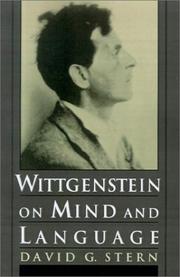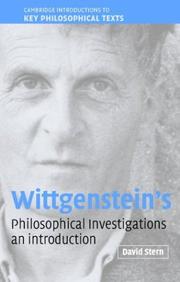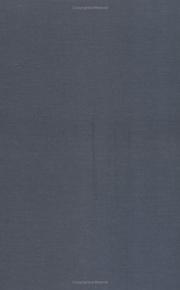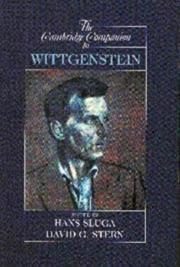| Listing 1 - 10 of 16 | << page >> |
Sort by
|

ISBN: 0195111478 0195080009 0199786143 9786610559886 1282267973 0198024177 9786612267970 1280559888 1435618653 9780195111477 Year: 1995 Publisher: New York: Oxford university press,
Abstract | Keywords | Export | Availability | Bookmark
 Loading...
Loading...Choose an application
- Reference Manager
- EndNote
- RefWorks (Direct export to RefWorks)
Investigates what motivated Wittgenstein's philosophical writing, throwing light on the "Tractatus" and "Philosophical Investigations". This book is an exposition of Wittgenstein's early conception of the nature of representation and how his later revision and criticism of that work led to a radically different way of looking at mind and language.
Language and languages --- Philosophy of mind --- Philosophy --- History --- Electronic books. -- local. --- Language and languages -- Philosophy -- History -- 20th century. --- Philosophy of mind -- History -- 20th century. --- Wittgenstein, Ludwig, -- 1889-1951 -- Contributions in philosophy of language. --- Wittgenstein, Ludwig, -- 1889-1951 -- Contributions in philosophy of mind. --- Philosophy & Religion --- Wittgenstein, Ludwig, --- -Contributions in philosophy of mind --- Contirbutions in philosophy of language --- Contributions in philosophy of language --- Mind, Philosophy of --- Mind, Theory of --- Theory of mind --- Cognitive science --- Metaphysics --- Philosophical anthropology --- Wei-tʻe-ken-ssu-tʻan, --- Wei-tʻe-ken-ssu-tʻan, Lu-te-wei-hsi, --- Wittgenstein, L. --- Vitgenshteĭn, L., --- Wei-ken-ssu-tʻan, --- Pitʻŭgensyutʻain, --- Vitgenshteĭn, Li︠u︡dvig, --- Weitegenshitan, --- Wittgenstein, Ludovicus, --- Vitgenshtaĭn, Ludvig, --- ויטגנשטיין, לודוויג --- 维特根斯坦, --- Philosophy of language --- Theory of knowledge --- Wittgenstein, Ludwig --- 20th century --- Contributions in philosophy of mind --- Wittgenstein, Ludwig, - 1889-1951 - Contributions in philosophy of mind. --- Wittgenstein, Ludwig, - 1889-1951 - Contirbutions in philosophy of language. --- Language and languages - Philosophy - History - 20th century. --- Wittgenstein, Ludwig Josef Johann, --- Language and languages - Philosophy - History - 20th century --- Philosophy of mind - History - 20th century --- WITTGENSTEIN (LUDWIG JOSEF), 1889-1951 --- PHILOSOPHY OF LANGUAGE --- PHILOSOPHY OF MIND --- LANGUAGE AND LANGUAGES --- HISTORY --- 20th CENTURY --- PHILOSOPHY

ISBN: 0521891329 0521814421 1107159148 0511648391 0511561660 1139167189 051122883X 0511229674 9780511648397 9781139167185 9780521814423 9780521891325 Year: 2004 Publisher: New York : Cambridge University Press,
Abstract | Keywords | Export | Availability | Bookmark
 Loading...
Loading...Choose an application
- Reference Manager
- EndNote
- RefWorks (Direct export to RefWorks)
In this new introduction to a classic philosophical text, David Stern examines Wittgenstein's Philosophical Investigations. He gives particular attention to both the arguments of the Investigations and the way in which the work is written, and especially to the role of dialogue in the book. While he concentrates on helping the reader to arrive at his or her own interpretation of the primary text, he also provides guidance to the unusually wide range of existing interpretations, and to the reasons why the Investigations have inspired such a diversity of readings. Following closely the text of the Investigations and meant to be read alongside it, this survey is accessible to readers with no previous background in philosophy. It is well-suited to university-level courses on Wittgenstein, but can also be read with profit by students in other disciplines.
Language and languages --- Philosophy --- Mental philosophy --- Humanities --- Wittgenstein, Ludwig, --- Wittgenstein, Ludwig --- Arts and Humanities --- Philosophy. --- Semantics (Philosophy)
Multi
ISBN: 9781108425872 9781108349260 9781108441681 Year: 2018 Publisher: Cambridge Cambridge University Press
Abstract | Keywords | Export | Availability | Bookmark
 Loading...
Loading...Choose an application
- Reference Manager
- EndNote
- RefWorks (Direct export to RefWorks)
Book
ISBN: 1108611362 1108349269 1108644066 1108425879 1108441688 Year: 2018 Publisher: Cambridge : Cambridge University Press,
Abstract | Keywords | Export | Availability | Bookmark
 Loading...
Loading...Choose an application
- Reference Manager
- EndNote
- RefWorks (Direct export to RefWorks)
Wittgenstein's 'middle period' is often seen as a transitional phase connecting his better-known early and later philosophies. The fifteen essays in this volume focus both on the distinctive character of his teaching and writing in the 1930s, and on its pivotal importance for an understanding of his philosophy as a whole. They offer wide-ranging perspectives on the central issue of how best to identify changes and continuities in his philosophy during those years, as well as on particular topics in the philosophy of mind, religion, ethics, aesthetics, and the philosophy of mathematics. The volume will be valuable for all who are interested in this formative period of Wittgenstein's development.
Wittgenstein, Ludwig, --- Wei-tʻe-ken-ssu-tʻan, --- Wei-tʻe-ken-ssu-tʻan, Lu-te-wei-hsi, --- Wittgenstein, L. --- Vitgenshteĭn, L., --- Wei-ken-ssu-tʻan, --- Pitʻŭgensyutʻain, --- Vitgenshteĭn, Li︠u︡dvig, --- Weitegenshitan, --- Wittgenstein, Ludovicus, --- Vitgenshtaĭn, Ludvig, --- ויטגנשטיין, לודוויג --- 维特根斯坦, --- Wittgenstein, Ludwig Josef Johann,

ISBN: 0521825539 0521532604 9780521532600 0511210639 9780511210631 9780521825535 0511216009 9780511216008 0511214219 9780511214219 9780511616914 0511616910 128051583X 9781280515835 1107146666 0511314981 0511212402 Year: 2004 Publisher: Cambridge, U.K. ; New York : Cambridge University Press,
Abstract | Keywords | Export | Availability | Bookmark
 Loading...
Loading...Choose an application
- Reference Manager
- EndNote
- RefWorks (Direct export to RefWorks)
Otto Weininger was one of the most controversial and widely read authors of fin-de-siècle Vienna. He was both condemned for his misogyny, self-hatred, anti-semitism and homophobia, as well as praised for his uncompromising and outspoken approach to gender and morality. For Wittgenstein Weininger was a 'remarkable genius'. He repeatedly recommended Weininger's Sex and Character to friends and students and included the author on a short list of figures who had influenced him. The purpose of this new collection of essays is to explore the various ways in which Wittgenstein absorbed and responded to Weininger's ideas. Written by an international team of experts on Wittgenstein and Weininger, the volume is especially timely in the light of recent translations of Weininger's work and will appeal to anyone interested in the history of 20th century philosophy, and the literary and cultural history of fin-de-siècle Vienna.
Weininger, Otto, --- Wittgenstein, Ludwig, --- Influence. --- Wei-tʻe-ken-ssu-tʻan, --- Wei-tʻe-ken-ssu-tʻan, Lu-te-wei-hsi, --- Wittgenstein, L. --- Vitgenshteĭn, L., --- Wei-ken-ssu-tʻan, --- Pitʻŭgensyutʻain, --- Vitgenshteĭn, Li︠u︡dvig, --- Weitegenshitan, --- Wittgenstein, Ludovicus, --- Vitgenshtaĭn, Ludvig, --- ויטגנשטיין, לודוויג --- 维特根斯坦, --- Ṿaininger, Oṭo, --- וויינינגער, אטא, --- ויינינגר, אוטו --- װײנינגער, אטא --- Wittgenstein, Ludwig Josef Johann, --- Weininger, Otto. --- Philosophy --- Philosophy & Religion --- Arts and Humanities --- Weininger, Otto, - 1880-1903 - Influence. --- Wittgenstein, Ludwig, - 1889-1951. --- Weininger, Otto, - 1880-1903 --- Philosophy, German.

ISBN: 0521465915 0521460255 9780521465915 9781139000697 9780521460255 Year: 1996 Publisher: Cambridge : Cambridge university press,
Abstract | Keywords | Export | Availability | Bookmark
 Loading...
Loading...Choose an application
- Reference Manager
- EndNote
- RefWorks (Direct export to RefWorks)
Wittgenstein, Ludwig --- 1 WITTGENSTEIN, LUDWIG --- 1 WITTGENSTEIN, LUDWIG Filosofie. Psychologie--WITTGENSTEIN, LUDWIG --- Filosofie. Psychologie--WITTGENSTEIN, LUDWIG --- Wittgenstein, Ludwig, --- Wei-tʻe-ken-ssu-tʻan, --- Wei-tʻe-ken-ssu-tʻan, Lu-te-wei-hsi, --- Wittgenstein, L. --- Vitgenshteĭn, L., --- Wei-ken-ssu-tʻan, --- Pitʻŭgensyutʻain, --- Vitgenshteĭn, Li︠u︡dvig, --- Weitegenshitan, --- Wittgenstein, Ludovicus, --- Vitgenshtaĭn, Ludvig, --- ויטגנשטיין, לודוויג --- 维特根斯坦, --- Philosophy, Austrian --- Philosophie autrichienne --- Wittgenstein, Ludwig, - 1889-1951. --- Wittgenstein, Ludwig Josef Johann, --- Wittgenstein, Ludwig, - 1889-1951 --- Wittgenstein (ludwig josef), 1889-1951
Book
ISBN: 1108547249 1108548342 1316341283 Year: 2018 Publisher: Cambridge, England : Cambridge University Press,
Abstract | Keywords | Export | Availability | Bookmark
 Loading...
Loading...Choose an application
- Reference Manager
- EndNote
- RefWorks (Direct export to RefWorks)
Ludwig Wittgenstein (1889-1951) is one of the most important and influential philosophers in modern times, but he is also one of the least accessible. In this volume, leading experts chart the development of his work and clarify the connections between its different stages. The essays, which are both expository and original, address central themes in Wittgenstein's writing on a wide range of topics, particularly his thinking about the mind, language, logic, and mathematics. The contributors illuminate the character of the whole body of work by focusing on key topics: the style of the philosophy, the conception of grammar contained in it, rule-following, convention, logical necessity, the self, and what Wittgenstein called, in a famous phrase, 'forms of life'. This revised edition includes a new introduction, five new essays - on Tractarian ethics, Wittgenstein's development, aspects, the mind, and time and history - and a fully updated comprehensive bibliography.
Book
ISBN: 1139815385 1139000691 Year: 1996 Publisher: Cambridge : Cambridge University Press,
Abstract | Keywords | Export | Availability | Bookmark
 Loading...
Loading...Choose an application
- Reference Manager
- EndNote
- RefWorks (Direct export to RefWorks)
Ludwig Wittgenstein (1889-1951) is one of the most important, influential, and often-cited philosophers of the twentieth century, yet he remains one of its most elusive and least accessible. The essays in this volume address central themes in Wittgenstein's writings on the philosophy of mind, language, logic, and mathematics. They chart the development of his work and clarify the connections between its different stages. The contributors illuminate the character of the whole body of work by keeping a tight focus on some key topics: the style of the philosophy, the conception of grammar contained in it, rule-following, convention, logical necessity, the self, and what Wittgenstein called, in a famous phrase, 'forms of life'.
Book
ISBN: 1316434974 1139644602 1316430006 1107041163 1108730191 Year: 2016 Publisher: Cambridge, England : Cambridge University Press,
Abstract | Keywords | Export | Availability | Bookmark
 Loading...
Loading...Choose an application
- Reference Manager
- EndNote
- RefWorks (Direct export to RefWorks)
This edition of G. E. Moore's notes taken at Wittgenstein's seminal Cambridge lectures in the early 1930s provides, for the first time, an almost verbatim record of those classes. The presentation of the notes is both accessible and faithful to their original manuscripts, and a comprehensive introduction and synoptic table of contents provide the reader with essential contextual information and summaries of the topics in each lecture. The lectures form an excellent introduction to Wittgenstein's middle-period thought, covering a broad range of philosophical topics, ranging from core questions in the philosophy of language, mind, logic, and mathematics, to illuminating discussions of subjects on which Wittgenstein says very little elsewhere, including ethics, religion, aesthetics, psychoanalysis, and anthropology. The volume also includes a 1932 essay by Moore critiquing Wittgenstein's conception of grammar, together with Wittgenstein's response. A companion website offers access to images of the entire set of source manuscripts.
Philosophy. --- Mental philosophy --- Humanities --- Moore, G. E. --- Moore, George Edward, --- Mūra, Jī. Ī., --- Wittgenstein, Ludwig,
Digital
ISBN: 9781139644600 Year: 2016 Publisher: Cambridge Cambridge University Press
Abstract | Keywords | Export | Availability | Bookmark
 Loading...
Loading...Choose an application
- Reference Manager
- EndNote
- RefWorks (Direct export to RefWorks)
| Listing 1 - 10 of 16 | << page >> |
Sort by
|

 Search
Search Feedback
Feedback About UniCat
About UniCat  Help
Help News
News